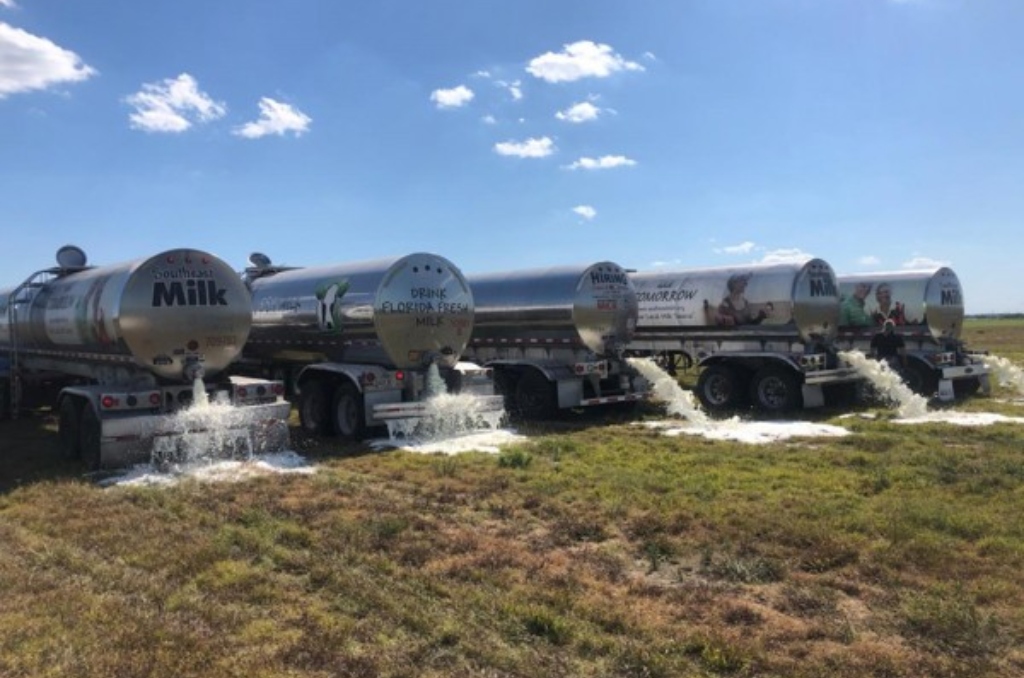Tankers dump milk in a field in Okeechobee, Florida, USA on Thursday, April 2, 2020. Photo: www.lakeokeechobeenews.com/Larson Dairy, Inc. Caption taken from www.heraldtribune.com.
There’s no use crying over spilled milk, but here in Florida, there is a reason to lament over all the milk being spilled due to the coronavirus. No thanks to store closures, schools and supermarkets limiting the sale of milk, the agriculture industry in Florida sees itself being heavily (negatively) impacted by this virus.
Life on Sunshine State farms (and in general) has been disrupted, and there’s no telling when it will return to “normal.”
“The dairy farmers of the state of Florida are in a tremendous place of trouble right now,” said Brittany Nickerson Thurlow, a fifth-generation dairy farmer in Zolfo Springs. “And it is not because we want to keep milk from people.”
On April 1st, the Times-Union reported that about 135 milk tankers dumped roughly 800,000 gallons of milk from 70 local farms. That’s more than enough to fill an Olympic-size swimming pool (according to www.heraldtribune.com), which holds roughly 660,000-plus gallons of water.
The closure of schools, theme parks and some restaurants has led to a dramatically smaller demand for milk products. That decreased demand has resulted in a situation where dairy farms have containers and tankers full of milk with no one to sell it to. As a result, farmers have to watch as their hard work and money in the form of milk literally go down the drain in a field in Okeechobee.
Florida Agriculture Commissioner Nicole “Nikki” Fried and Florida Farm Bureau President John L. Hoblick held a town hall meeting on April 2 to discuss the unprecedented problems facing the agriculture industry in this crisis.
“Our team is working tirelessly to find solutions,” said Commissioner Fried in the beginning of the town hall. “My priority is preventing and mitigating losses for your crops. We’re coordinating with other Florida state departments, like the Department of Corrections, in need of fresh foods so they can purchase fresh from Florida. But in order for any of the state departments to purchase from our farmers, Florida producers and farmers must be registered on My Florida Marketplace. It’s really important if you’re not already registered to register. It is the only way our state dollars can go to purchase produce.”
Grocery stores have put limitations on how much milk a customer could buy. One Publix at Prima Vista Crossing in Port St. Lucie implemented a two-gallon limit per household rule. The motivation behind this rule was to discourage people from panic buying and hoarding.
Farmers believe it may be time now to lift those restrictions and let consumers buy as much milk as they’d like, especially since milk production in Florida has been experiencing a delay, even a stop to production. The farming industry has been hit unprecedentedly due to this pandemic and should be helped out.
The federal Coronavirus Aid, Relief and Economic Security (CARES) Act was designed to help farmers during this crisis. The $2.2 trillion stimulus package designates $45 million to the Agricultural Marketing Service, a division of the USDA that houses its Dairy Program. President Donald Trump signed this package into law on March 27, 2020.
These funds are “to prevent, prepare for, and respond to coronavirus, domestically or internationally, including necessary expenses for salary costs associated with commodity grading, inspection, and audit services.”
A United States Department of Agriculture (USDA) spokesperson described the pandemic’s impact on the dairy industry as “swift, with rapid variance daily,” adding that the Department was evaluating how best to assist farmers through the CARES Act.
Ben Albritton, a Republican Senator from Bartow, is chairman of the Florida Senate Committee on Agriculture.
Dairy farms were included in the COVID-19 economic relief package recently passed by Congress. The bill included around $9.5 billion for livestock producers and dairies, but the details on how that money will be distributed and rolled out have been scant.
The coronavirus was first detected in Wuhan, China during late 2019, and by April 8, more than 1.5 million people worldwide have tested positive for the virus, and there have been more than 88,000 deaths around the globe.
Florida has had over 15,500 coronavirus cases, including over 300 deaths, as of the Department of Health’s evening count on Wednesday, April 8. Gov. Ron DeSantis’ statewide “safer-at-home” order remains in effect until at least April 30.
In the United States, there have been more than 425,000 cases, the largest number of cases so far of any country in the world. There have been 14,500 deaths so far in the U.S. as well.
President Donald Trump said on March 29 he expects the number of cases and deaths in America to peak by April 12, and that the social distancing guidelines have been extended to April 30. Trump also said he expects a “full recovery” by June 1.
Melissa’s career in writing started more than 20 years ago. Today, she lives in South Florida with her husband and two boys.

